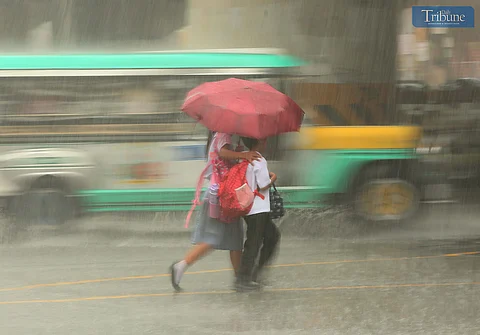
- NEWS
- the EDIT
- COMMENTARY
- BUSINESS
- LIFE
- SHOW
- ACTION
- GLOBAL GOALS
- SNAPS
- DYARYO TIRADA
- MORE

A health expert identified climate change as one of the driving factors for the rising dengue cases in the country. Dr. Lulu Bravo, executive director of the Philippine Foundation for Vaccination, explained that the Philippines has a lot of water sources that could serve as breeding grounds for mosquitoes.
"We try to do something to get rid of the breeding sites for mosquitoes, but we can't stop climate change. It's raining non-stop [even though it's not rainy season yet]," Bravo told reporters on the sidelines of the END Dengue Coalition in Ortigas, Pasig on Tuesday, 18 February. "The problem in the Philippines is climate change. The rains are non-stop," she reiterated.
The vaccine expert further explained that Aedes aegypti, a mosquito that carries the dengue virus, lays eggs on and in containers holding fresh water, such as tap or rainwater.
"This is the reason why dengue has spread throughout the world. Before, only countries in the Asia Pacific countries had it and they are only 20 countries including Malaysia, Thailand, Indonesia, and Vietnam in the 1950s and 1960s," Bravo noted.
"From 20 countries, there are now 134 countries worldwide that have Aedes aegypti mosquito capable of transmitting the dengue virus. Why? Because it can now survive in a colder temperatures and its virus can mutate so it just doesn't stay in tropical countries," she added.
About half of the world's population is already exposed to dengue risk, a 2019 climate modeling study cited by the Yale School of Environment, projected that under a moderate warming scenario, an additional two billion people could be at risk of dengue exposure by 2080, compared to 2015.
Moreover, according to the 2020 Lancet Countdown on Health and Climate Change, rising global temperatures between 1950 and 2018 increased the climate sustainability for the transmission of the dengue virus by almost nine percent for aedes aegypti.
On Tuesday, various health leaders called on President Ferdinand R. Marcos Jr. to approve a dengue vaccine amid the rise in mosquito-borne cases in the country.
The Quezon City government declared a dengue outbreak following the death of 10 individuals, mostly children. The Department of Health on Monday, 17 February, meanwhile, noted a "concerning rise" in dengue cases in nine other local government units, including Metro Manila, Calabarzon, and Central Luzon.
Latest data from the DOH showed a sharp increase in dengue cases, with 28,234 reported as of 1 February, a 40 percent rise from the same period last year. From January to November 2024, the Philippines has logged 881 dengue deaths, continuing to be the number one in Southeast Asia in terms of dengue cases and deaths consistently in the past years up to the present.
